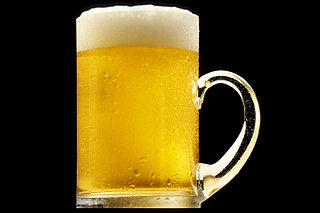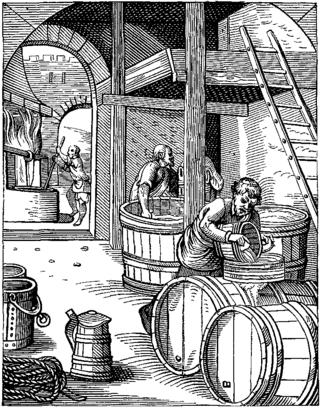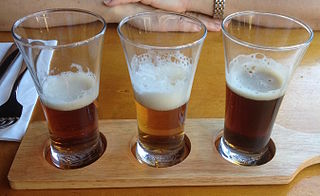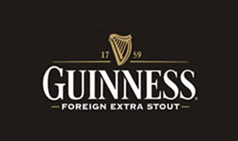Related Research Articles

Beer is one of the oldest types of alcoholic drinks in the world, and the most widely consumed. It is the third most popular drink overall after potable water and tea. It is produced by the brewing and fermentation of starches, mainly derived from cereal grains—most commonly from malted barley, though wheat, maize (corn), rice, and oats are also used. During the brewing process, fermentation of the starch sugars in the wort produces ethanol and carbonation in the resulting beer. Most modern beer is brewed with hops, which add bitterness and other flavours and act as a natural preservative and stabilizing agent. Other flavouring agents such as gruit, herbs, or fruits may be included or used instead of hops. In commercial brewing, the natural carbonation effect is often removed during processing and replaced with forced carbonation.

Brewing is the production of beer by steeping a starch source in water and fermenting the resulting sweet liquid with yeast. It may be done in a brewery by a commercial brewer, at home by a homebrewer, or communally. Brewing has taken place since around the 6th millennium BC, and archaeological evidence suggests that emerging civilizations, including ancient Egypt and Mesopotamia, brewed beer. Since the nineteenth century the brewing industry has been part of most western economies.

Yeast extracts consist of the cell contents of yeast without the cell walls; they are used as food additives or flavorings, or as nutrients for bacterial culture media. They are often used to create savory flavors and umami taste sensations, and can be found in a large variety of packaged food, including frozen meals, crackers, snack foods, gravy, stock and more. They are rich in B vitamins. Yeast extracts and fermented foods contain glutamic acid, an amino acid which adds an umami flavor. Glutamic acid is found in meat, cheese, fungi, and vegetables—such as broccoli, and tomatoes.

Yeasts are eukaryotic, single-celled microorganisms classified as members of the fungus kingdom. The first yeast originated hundreds of millions of years ago, and at least 1,500 species are currently recognized. They are estimated to constitute 1% of all described fungal species.

Homebrewing is the brewing of beer or other alcoholic beverages on a small scale for personal, non-commercial purposes. Supplies, such as kits and fermentation tanks, can be purchased locally at specialty stores or online. Beer was brewed domestically for thousands of years before its commercial production, although its legality has varied according to local regulation. Homebrewing is closely related to the hobby of home distillation, the production of alcoholic spirits for personal consumption; however home distillation is generally more tightly regulated.

Pale ale is a golden to amber coloured beer style brewed with pale malt. The term first appeared in England around 1703 for beers made from malts dried with high-carbon coke, which resulted in a lighter colour than other beers popular at that time. Different brewing practices and hop quantities have resulted in a range of tastes and strengths within the pale ale family.

Traditional ginger beer is a sweetened and carbonated, usually non-alcoholic beverage. Historically it was produced by the natural fermentation of prepared ginger spice, yeast and sugar.

The New Glarus Brewing Company is an American brewery founded in 1993. Located in New Glarus, Wisconsin, it is an independently owned craft brewery, whose products can only be found in Wisconsin. New Glarus Brewing Company is the 15th largest craft brewer and 25th largest overall brewing company in the United States, by sales volume.

George O. Poinar Jr. is an American entomologist and writer. He is known for popularizing the idea of extracting DNA from insects fossilized in amber, an idea which received widespread attention when adapted by Michael Crichton for the book and movie Jurassic Park.
Steam beer is a highly effervescent beer made by fermenting lager yeasts at warmer ale yeast fermentation temperatures. It has two distinct but related meanings:

St. James's Gate Brewery is a brewery founded in 1759 in Dublin, Ireland, by Arthur Guinness. The company is now a part of Diageo, a company formed from the merger of Guinness and Grand Metropolitan in 1997. The main product of the brewery is Draught Guinness.

Beer is the most popular alcoholic drink in New Zealand, accounting for 63% of available alcohol for sale. At around 64.7 litres per person per annum, New Zealand is ranked 27th in global beer consumption per capita. The vast majority of beer produced in New Zealand is a type of lager, either pale or amber in colour, and typically 4–5% alcohol by volume.

Beer styles differentiate and categorise beers by colour, flavour, strength, ingredients, production method, recipe, history, or origin.

Beer is one of the oldest drinks humans have produced. The first chemically confirmed barley beer dates back to the 5th millennium BC in modern-day Iran, and was recorded in the written history of ancient Egypt and Mesopotamia, and spread throughout the world; a 3,900-year-old Sumerian poem honouring Ninkasi, the patron goddess of brewing, contains the oldest surviving beer recipe, describing the production of beer from barley bread, and in China, residue on pottery dating from around 5,000 years ago shows beer was brewed using barley and other grains.

Guinness Foreign Extra Stout (FES) is a stout produced by the Guinness Brewery, an Irish brewing company owned by Diageo, a drinks multinational. First brewed by Guinness in 1801, FES was designed for export, and is more heavily hopped than Guinness Draught and Extra Stout, which gives it a more bitter taste, and typically has a higher alcohol content. The extra hops were intended as a natural preservative for the long journeys the beer would take by ship.
Wort is the liquid extracted from the mashing process during the brewing of beer or whisky. Wort contains the sugars, the most important being maltose and maltotriose, that will be fermented by the brewing yeast to produce alcohol. Wort also contains crucial amino acids to provide nitrogen to the yeast as well as more complex proteins contributing to beer head retention and flavour.

Lager is beer which has been brewed and conditioned at low temperature. Lagers can be pale, amber, or dark. Pale lager is the most widely consumed and commercially available style of beer. The term "lager" comes from the German for "storage", as the beer was stored before drinking, traditionally in the same cool caves in which it was fermented.

A brewery or brewing company is a business that makes and sells beer. The place at which beer is commercially made is either called a brewery or a beerhouse, where distinct sets of brewing equipment are called plant. The commercial brewing of beer has taken place since at least 2500 BC; in ancient Mesopotamia, brewers derived social sanction and divine protection from the goddess Ninkasi. Brewing was initially a cottage industry, with production taking place at home; by the ninth century, monasteries and farms would produce beer on a larger scale, selling the excess; and by the eleventh and twelfth centuries larger, dedicated breweries with eight to ten workers were being built.
Beer is produced through steeping a sugar source in water and then fermenting with yeast. Brewing has taken place since around the 6th millennium BC, and archeological evidence suggests that this technique was used in ancient Egypt. Descriptions of various beer recipes can be found in Sumerian writings, some of the oldest known writing of any sort. Brewing is done in a brewery by a brewer, and the brewing industry is part of most western economies. In 19th century Britain, technological discoveries and improvements such as Burtonisation and the Burton Union system significantly changed beer brewing.

The Research Institute of Brewing and Malting (RIBM) in Czech - was founded in 1887 and since 1994 It has been a joint-stock company. It is one of the oldest scientific research institutes in the Central European region.
References
- ↑ "Raul J. Cano, Ph.D." web.calpoly.edu.
- ↑ Biba, Erin (July 20, 2009). "Amber Ale: Brewing Beer From 45-Million-Year-Old Yeast" – via www.wired.com.
- ↑ Oppenheim, Gabe, The Beer That Takes You Back ... Millions of Years, Washington Post, September 1, 2008